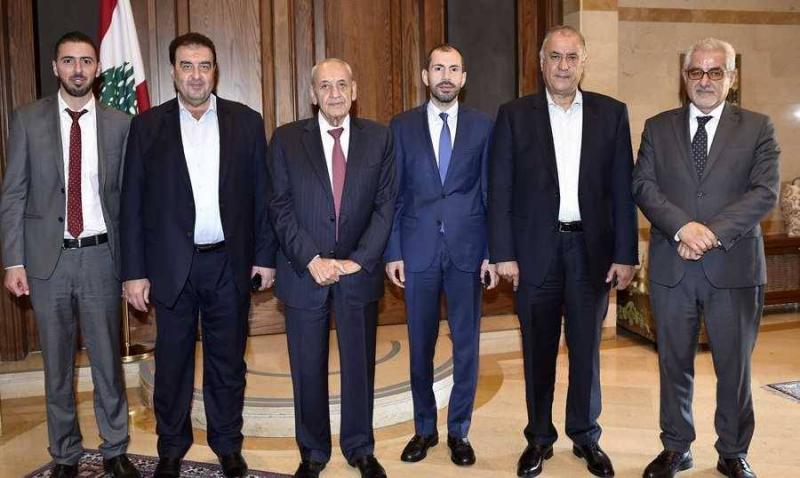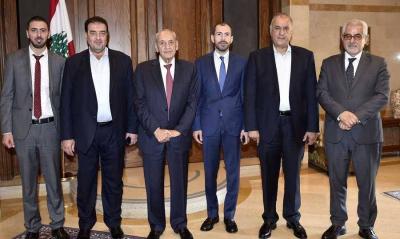The "Moderation" initiative is stumbling, with the presidential file remaining stuck in a vicious circle. The efforts exerted by the group of five ambassadors seem inadequate so far to achieve their desired outcome, similar to the majority of Lebanese, regarding the election of a new president and ending the entrenched political crisis that prevents addressing the economic and financial crisis through the implementation of reforms, which continue to face significant obstruction from the ruling system, as reported by "Al-Liwaa."
This stagnation is affecting the movement of the National Moderation Bloc, which has now entered the second phase of its presidential initiative. Efforts are being made to keep it alive, as they strive to achieve what has been termed the "second round," which was not originally significant at the beginning of their movement. It is clear that this stagnation has prompted the second round primarily to buy more time, which is the main aim of the initiative, while awaiting developments in Gaza, regional negotiations, and the fate of U.S. Presidential Advisor Amos Hochstein's mission, which is also contingent on the fate of the precarious Ramadan truce.
Notably, it is significant that the Speaker of the Parliament, Nabih Berri, has declared himself the father of the Moderation initiative. He has been the main promoter of it and the most influential driver to make it accessible to various local and foreign parties. This is well understood by the powers that agreed to the initiative after direct communication with the Speaker.
However, the stagnation in Gaza, in one way or another, leads to the faltering of the initiative, alongside the consecutive blows it receives from various sides, creating an impression close to absolute truth that there are elements engaged in a comprehensive delaying process aimed at filling lost time and partially distracting public opinion from the ongoing war in the south while awaiting its conclusion in Gaza.
That said, there is currently an effort to leverage any potential truce in Gaza to swiftly complete the presidential requirement, ideally within the first quarter of the truce period if it is established. Washington appears convinced that a truce will come to fruition regardless of the obstinacy of the involved parties, namely Israeli Prime Minister Benjamin Netanyahu and Hamas, yet there are currently no signs of imminent positives linked to the stagnation, which is largely either fabricated or the result of conditional and counter-conditional dynamics.
This complex reality has led Hochstein to temporarily suspend his Lebanese mission and take a step back while awaiting any Palestinian developments to encourage him to resume his efforts towards a long-term resolution of the border issues between Lebanon and Israel, which he is preparing through step-by-step arrangements. A primary short-term goal is to return residents of northern settlements to their homes, conditional upon an immediate ceasefire once a truce in Gaza is achieved, according to "Al-Liwaa."
Moreover, French presidential envoy Jean-Yves Le Drian is postponing his visit to Beirut, convinced that there is nothing new to build upon to achieve the hoped-for breakthrough from a French perspective. Concurrently, it has been noteworthy that discussions have resumed about presidential candidates, with new names being floated based on the movement of the group of five ambassadors and the Moderation Bloc's initiative. It has also been striking to observe a well-known political-media apparatus working to burn names of candidates that pose a challenge to the body spearheading this discrediting campaign.
In this context, the Shiite duo remains committed to their candidate, the head of the Marada Movement, Sleiman Frangieh. In recent days, they have taken a step forward in challenging the will of the vast majority of Christians who reject this presidential option. A senior official in Hezbollah has been quoted saying: "We are not perturbed by our commitment to Frangieh even if the presidential vacuum continues, as long as we, along with AMAL Movement, agree on this option."
It has become clear that the Shiite duo is unconcerned about opposing the prevailing Christian and national opinion that advocates for a third candidate who could secure broad consensus. Specifically, the party's considerations surpass local concerns over the presidency and growing fears of diminishing powers and the fragmentation of the position and its prestige, touching upon geopolitical concerns related to the regional project and Iranian interests.
This reality indicates that the circumstances are not yet ripe, despite occasional openings that quickly close either due to the stagnation of the ceasefire arrangements in Gaza or as a result of the duo and its allies considering that there is no urgent presidential matter, while awaiting developments from beyond the seas.




